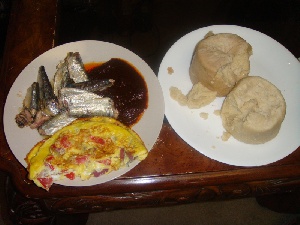Rising food prices have been found to be the topmost household worry for most Ghanaians who spend more than half of their earnings on food. Since the beginning of the year, the situation has been compounded by the weakening of the Ghana Cedi, which has weakened households’ purchasing power.
The United Nations Development Programme (UNDP) in its latest study has found that Ghanaians spend about 62 percent of their incomes on sourcing food, and the situation has been exacerbated in some areas of the country where the cost of such things as rent, and commuting are higher.
Even though, the figure is one of the lowest among several other sub-Saharan Africa countries, Ghanaian household expenses on food is 30 times more than what pertains in developed and other western countries.
Ironically, people living in rural Ghana where almost all of the country’s food crops are produced spend more on food than their urban counterparts, which is a deviation from other regions where net food buyers are mostly higher income urban residents.
In a first-ever document prepared by the UNDP, “Africa Human Development Report 2012” which was launched in Accra last week, smallholder farmers devoted most of their resources to growing food but their farm productivity is too low to meet all their food needs -- so much of their cash income goes more toward food rather than to other goods.
The document, which is geared towards ensuring food security in the future, seeks to explain why there is so much hunger and food insecurity in Africa.
According to the UNDP, even though government’s policies such as Livelihood and Empowerment Against Poverty has helped to up the income of the poor in the country, the erosion of the purchasing power of the poor can be severe during spikes in food prices since poor people devote a larger share of their total consumption to food than do wealthier people.
A renowned economist, scientist and chairman of the CSIR, Professor Edward Ayensu, has warned against degradation of consumers’ purchasing power and its implications for social peace.
He said the food situation in the world must be of concern to governments on the continent, who must consider it as a national security issue.
“Governments must ensure adequate food production for the people in order to avert any social unrest. It is unthinkable to, for instance, think that Ghana imports about 500,000 tonnes of tomato-paste a year when we have the best places to produce tomatoes in the country.
“Food security is a serious matter, which must be treated as a national security issue,” he said. At present, soaring food prices have sparked riots in many countries around the world, which has generated more concern among governments than the rise in oil and petrol prices.
The United Nations resident coordinator and UNDP resident representative, Ms Ruby Sandhu-Rojon, said the prospect for food production is threatened by the weather, extreme poverty, and low agriculture productivity as well food price volatility.
“There is a serious problem of food insecurity in Africa and action must be taken to correct the situation. There is no issue more fundamental to human beings than food security,” she said.
She said among the actions to be taken for ensuring adequate food security is to empower the rural poor and women, build resilience of families, improve agriculture productivity and advance nutrition.
Business News of Monday, 4 June 2012
Source: BFT

















